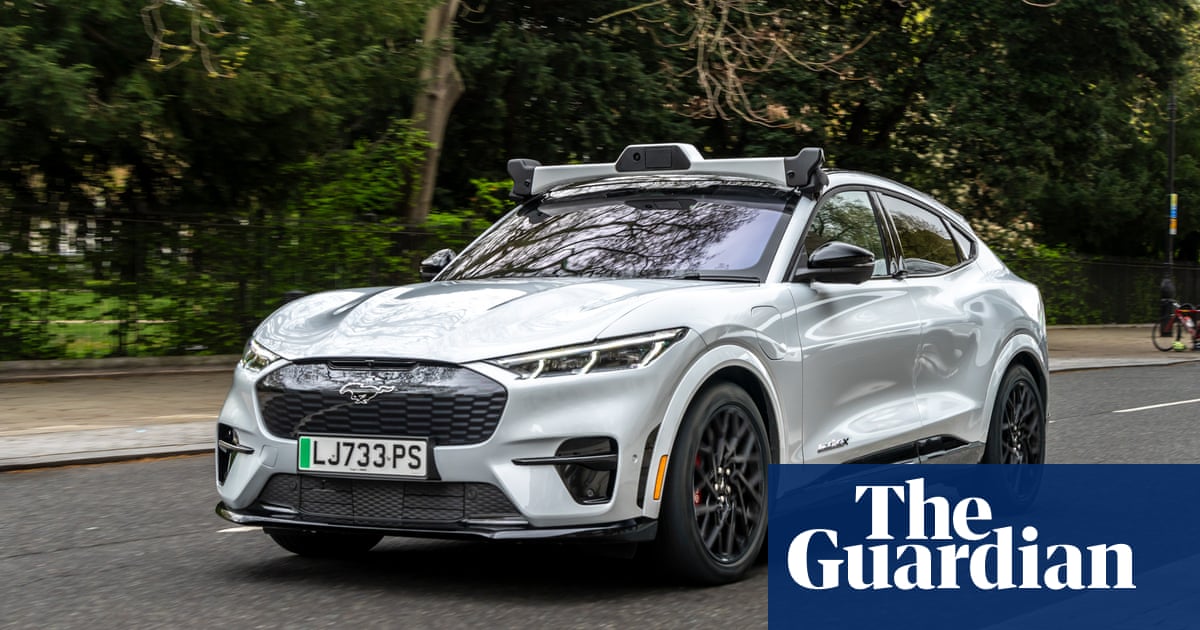Tech firms have transformed how the public takes taxis, but echoes remain from the minicab controllers of old: not least the promise that a long-awaited vehicle is – really, this time – just around the corner.
Now Uber has announced that self-driving taxis will appear on roads in London next year, after the UK government confirmed that trials of fully autonomous vehicles would be brought forward to spring 2026.
For the first time in Europe, companies will be allowed to run pilots of small-scale taxi or “bus-like” services for public use without any human safety driver onboard or in the driving seat.
Uber will work with the UK tech firm Wayve to launch trials of taxis bookable via its app in the capital, its largest European market.
A fuller rollout of self-driving taxis, or robotaxis, will come after the Automated Vehicles Act fully takes effect in late 2027.
The UK has sped up the process now that driverless taxis have become established in San Francisco in the US and numerous cities in China. Uber rolled out its first driverless taxis with the US firm Waymo in Austin, Texas, in March, where Tesla is planning to launch a rival autonomous service this month.
The Department for Transport (DfT) said the technology would make UK roads safer and that it could create 38,000 jobs and an industry worth £42bn by 2035.
The transport secretary, Heidi Alexander, said: “The future of transport is arriving. Self-driving cars could bring jobs, investment, and the opportunity for the UK to be among the world leaders in new technology.”
The DfT said self-driving vehicles could improve transport for millions of people, adding new public transport options in rural areas and improving accessibility for those unable to drive.
Trials of self-driving vehicles have been taking place in the UK for more than a decade, using technology from Wayve and fellow British company Oxa (formerly Oxbotica). However, so far all road tests of cars or buses have needed a safety driver in the vehicle ready to take over the controls.
The Automated Vehicles Act will require self-driving cars to be approved after tests to demonstrate “a level of safety at least as high as competent and careful human drivers”, the department said.
Previous pledges to bring robotaxis to London, including a 2018 deal between Oxbotica and Addison Lee, did not come to fruition. The first driverless bus service, launched in Edinburgh in 2023, stopped operating for lack of passengers.
Autonomous taxi services have, however, operated hundreds of thousands of paid trips in the US. It has not been all plain sailing. General Motors abandoned its plans for an autonomous service after a number of incidents, including one where a taxi dragged and severely injured a pedestrian. But early reports suggest self-driving taxis are safer and some customers, especially women, prefer hiring a driverless taxi.
after newsletter promotion
Alex Kendall, a co-founder and the chief executive of Wayve, said the accelerated trials would put the UK in a leading position for fully autonomous cars, adding: “These early pilots will help build public trust and unlock new jobs, services and markets.”
Gavin Jackson, Oxa’s CEO, said the announcement “shows that Britain is ready for this technology”.
What it means for the rest of London’s taxi and Uber drivers is unclear. Labour’s transport spokesperson in the London assembly, Elly Baker, said it was cause for concern. “Although jobs might be created building and managing driverless cars, existing taxi and private hire drivers shouldn’t risk being left behind,” she said.
Black-cab drivers, who have long been threatened by the rise of Uber, appeared unruffled. The general secretary of the Licensed Taxi Drivers’ Association, Steve McNamara, said: “They are living in fantasy land. We’re probably going to have flying taxis before we have autonomous ones in London.
“Most people haven’t got a robot hoover or a robot lawnmower even though they are absolutely fantastic. Are people who don’t trust a robot to cut their grass or clean their house going to trust one to take their kids to school or drive their elderly mum around?”
McNamara said autonomous taxis were struggling even in San Francisco’s grid layout. “I’m genuinely not worried. Come back to me in 2040,” he said.








